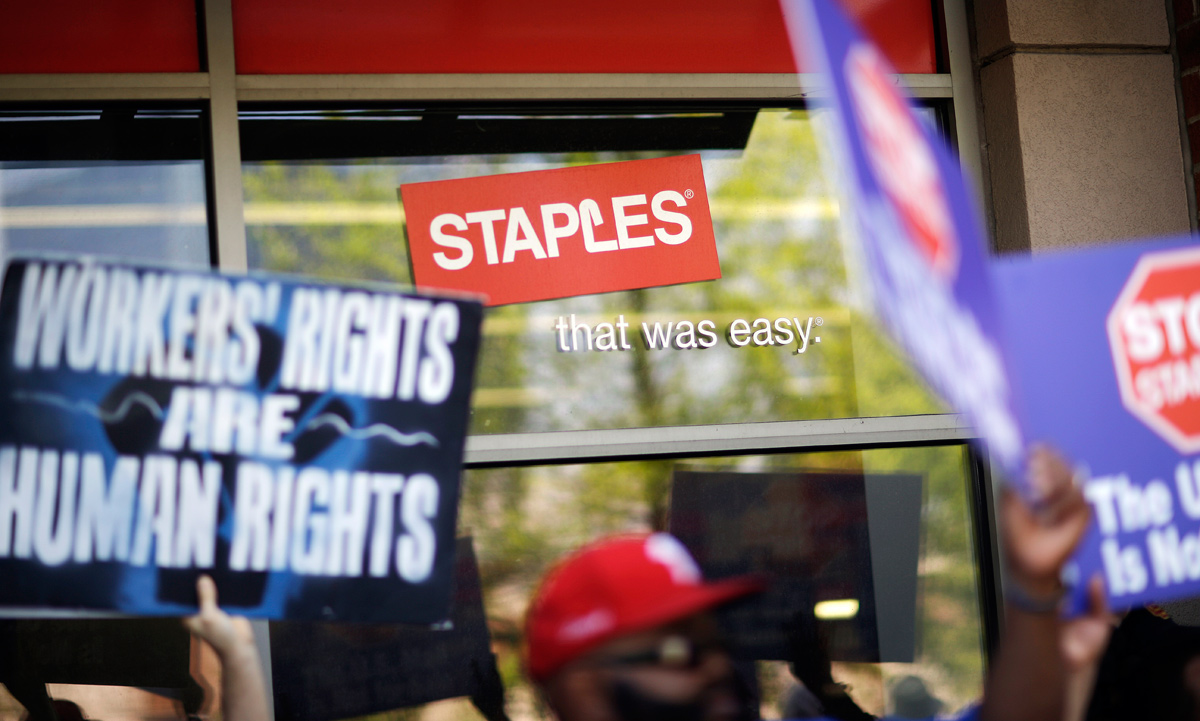Will Massachusetts Candidates Boycott Staples?

Framingham-based Staples has faced protests and boycotts since launching a pilot program that allows the chain to handle U.S. Mail. / Photo via Associated Press
Political campaigns buy a lot of office supplies, and here in Massachusetts many of those purchases take place at Framingham-based Staples. Candidates for statewide offices spent close to $30,000 at Staples, combined, the first half of 2014.
Looks like some of that business will go elsewhere for the time being.
This past weekend in Los Angeles, the American Federation of Teachers (AFT) passed a motion at its national convention to boycott Massachusetts-based office supply retailer Staples. The International Association of Fire Fighters (IAFF) joined the boycott around the same time. They are joining the American Postal Workers Union (APWU), which is boycotting Staples’ use of non-union workers at new subcontracted postal-service kiosks in their stores.
The APWU is pretty big, but the AFT, which includes the Boston Teachers Union, and IAFF are big political powers in Massachusetts. And the teachers are particularly keen on making a splash here in the company’s home state. AFT-Massachusetts approved a motion in support of the boycott a few weeks ago, says AFT-Massachusetts president Thomas Gosnell. And I am told that at the Saturday vote in Los Angeles, BTU representatives were wearing APWU shirts.
Gosnell, speaking to me from Los Angeles on Monday, would not quite call on candidates to join the Staples boycott, but strongly suggested he would like them to. “The more people who do not get whatever they get at Staples, the better,” he said. “We are going to be very outspoken, and political officials will certainly know where we stand.”
In response to my inquiries, Martha Coakley’s campaign for governor was the first to confirm to me that it has joined the boycott. Steve Grossman, who has been endorsed by the Central Massachusetts Area APWU affiliate, called me to say that “from this moment forward, we will not be making purchases at Staples anymore” until the conflict is resolved. Mike Lake, Leland Cheung, and Steve Kerrigan all tell me their campaigns for Lieutenant Governor are joining the boycott. So is the campaign of Tom Conroy, candidate for Treasurer, and Maura Healey, candidate for Attorney General. Healey’s campaign notes that her grandfather was a postal worker. I am waiting to hear from the others. [Update: Deb Goldberg’s campaign for Treasurer and Warren Tolman’s for Attorney General are also joining the boycott.] [Update: Don Berwick is also joining the boycott, telling me that while he does not object to appropriate private/public competition, “this is another example of the importance of standing up for the workers.”][Update: Treasurer candidate Barry Finegold’s campaign is also joining the boycott; this means that all the Democratic candidates in competitive statewide primaries are on board.]
Coakley’s campaign spent $1,848 at Staples in the first half of 2014, according to state disclosure reports. Grossman’s spent $2,223 (and he notes that additional purchases may yet show up on credit card reports). Every statewide Democratic candidate has spent at least some money there, ranging from $15 from Tom Conroy for Treasurer to $3,632 from Don Berwick for Governor.
The biggest Staples spender, however, is the least likely to join the boycott. That’s Republican Charlie Baker, whose campaign has spent $8,757 at Staples this year. Baker—not a big favorite of labor unions, anyway—has also received a maximum-allowed $500 contribution this year from Staples’s chairman/CEO Ronald Sargent, and at least one other member of the company’s board of directors.
Staples, of course, is closely associated with Mitt Romney, who helped fund and run the company early on through Bain Capital.
The campaigns might not need to eschew the big red stores for long, however. On Monday, Staples and the United States Postal Service announced—likely in response to the union pressure—that it will terminate the controversial program. APWU’s president quickly put out a release deriding the change as “trickery” and a mere change of the program’s name. But the movement could indicate that the fight won’t last long.

